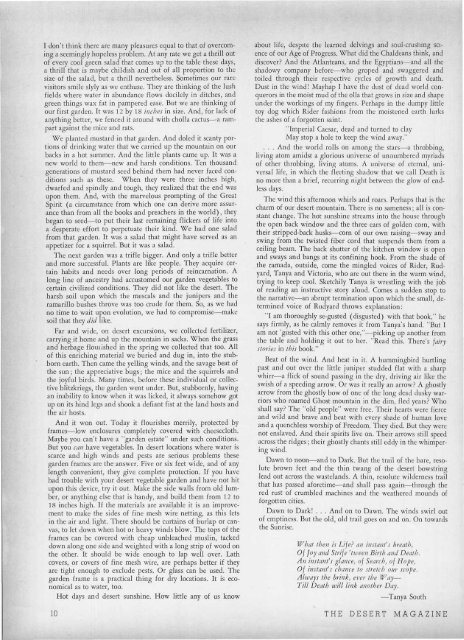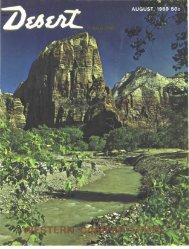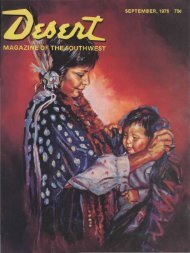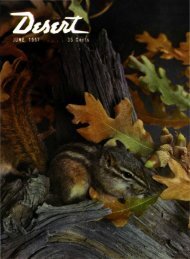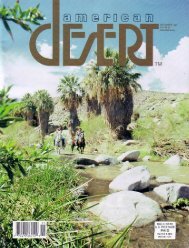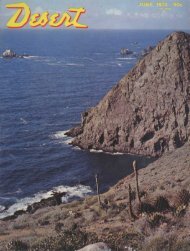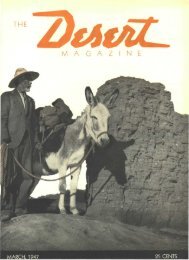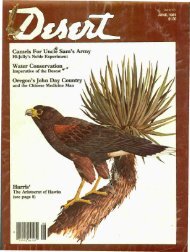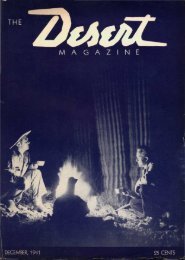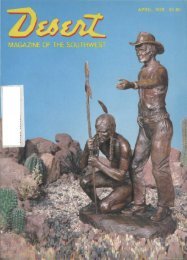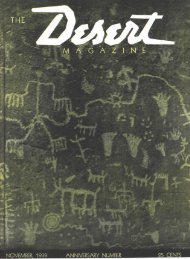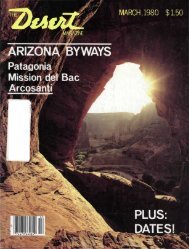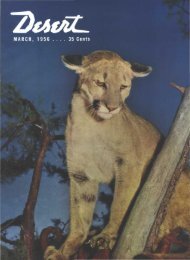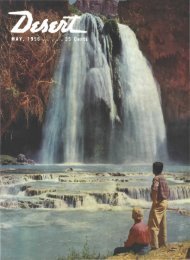THE M A G A Z I N E - Desert Magazine of the Southwest
THE M A G A Z I N E - Desert Magazine of the Southwest
THE M A G A Z I N E - Desert Magazine of the Southwest
You also want an ePaper? Increase the reach of your titles
YUMPU automatically turns print PDFs into web optimized ePapers that Google loves.
I don't think <strong>the</strong>re are many pleasures equal to that <strong>of</strong> overcoming<br />
a seemingly hopeless problem. At any rate we get a thrill out<br />
<strong>of</strong> every cool green salad that comes up to <strong>the</strong> table <strong>the</strong>se days,<br />
a thrill that is maybe childish and out <strong>of</strong> all proportion to <strong>the</strong><br />
size <strong>of</strong> <strong>the</strong> salad, but a thrill never<strong>the</strong>less. Sometimes our rare<br />
visitors smile slyly as we enthuse. They are thinking <strong>of</strong> <strong>the</strong> lush<br />
fields where water in abundance flows docilely in ditches, and<br />
green things wax fat in pampered ease. But we are thinking <strong>of</strong><br />
our first garden. It was 12 by 18 inches in size. And, for lack <strong>of</strong><br />
anything better, we fenced it around with cholla cactus—a rampart<br />
against <strong>the</strong> mice and rats.<br />
We planted mustard in that garden. And doled it scanty portions<br />
<strong>of</strong> drinking water that we carried up <strong>the</strong> mountain on our<br />
backs in a hot summer. And <strong>the</strong> little plants came up. It was a<br />
new world to <strong>the</strong>m—new and harsh conditions. Ten thousand<br />
generations <strong>of</strong> mustard seed behind <strong>the</strong>m had never faced conditions<br />
such as <strong>the</strong>se. When <strong>the</strong>y were three inches high,<br />
dwarfed and spindly and tough, <strong>the</strong>y realized that <strong>the</strong> end was<br />
upon <strong>the</strong>m. And, with <strong>the</strong> marvelous prompting <strong>of</strong> <strong>the</strong> Great<br />
Spirit (a circumstance from which one can derive more assurance<br />
than from all <strong>the</strong> books and preachers in <strong>the</strong> world), <strong>the</strong>y<br />
began to seed—to put <strong>the</strong>ir last remaining flickers <strong>of</strong> life into<br />
a desperate effort to perpetuate <strong>the</strong>ir kind. We had one salad<br />
from that garden. It was a salad that might have served as an<br />
appetizer for a squirrel. But it was a salad.<br />
The next garden was a trifle bigger. And only a trifle better<br />
and more successful. Plants are like people. They acquire certain<br />
habits and needs over long periods <strong>of</strong> reincarnation. A<br />
long line <strong>of</strong> ancestry had accustomed our garden vegetables to<br />
certain civilized conditions. They did not like <strong>the</strong> desert. The<br />
harsh soil upon which <strong>the</strong> mescals and <strong>the</strong> junipers and <strong>the</strong><br />
ramarillo bushes throve was too crude for <strong>the</strong>m. So, as we had<br />
no time to wait upon evolution, we had to compromise—make<br />
soil that <strong>the</strong>y did like.<br />
Far and wide, on desert excursions, we collected fertilizer,<br />
carrying it home and up <strong>the</strong> mountain in sacks. When <strong>the</strong> grass<br />
and herbage flouiished in <strong>the</strong> spring we collected that too. All<br />
<strong>of</strong> this enriching material we buried and dug in, into <strong>the</strong> stubborn<br />
earth. Then came <strong>the</strong> yelling winds, and <strong>the</strong> savage beat <strong>of</strong><br />
<strong>the</strong> sun; <strong>the</strong> appreciative bugs; <strong>the</strong> mice and <strong>the</strong> squirrels and<br />
<strong>the</strong> joyful birds. Many times, before <strong>the</strong>se individual or collective<br />
blitzkriegs, <strong>the</strong> garden went under. But, stubbornly, having<br />
an inability to know when it was licked, it always somehow got<br />
up on its hind legs and shook a defiant fist at <strong>the</strong> land hosts and<br />
<strong>the</strong> air hosts.<br />
And it won out. Today it flourishes merrily, protected by<br />
frames—low enclosures completely covered with cheesecloth.<br />
Maybe you can't have a "garden estate" under such conditions.<br />
But you can have vegetables. In desert locations where water is<br />
scarce and high winds and pests are serious problems <strong>the</strong>se<br />
garden frames are <strong>the</strong> answer. Five or six feet wide, and <strong>of</strong> any<br />
length convenient, <strong>the</strong>y give complete protection. If you have<br />
had trouble with your desert vegetable garden and have not hit<br />
upon this device, try it out. Make <strong>the</strong> side walls from old lumber,<br />
or anything else that is handy, and build <strong>the</strong>m from 12 to<br />
18 inches high. If <strong>the</strong> materials are available it is an improvement<br />
to make <strong>the</strong> sides <strong>of</strong> fine mesh wire netting, as this lets<br />
in <strong>the</strong> air and light. There should be curtains <strong>of</strong> burlap or canvas,<br />
to let down when hot or heavy winds blow. The tops <strong>of</strong> <strong>the</strong><br />
frames can be covered with cheap unbleached muslin, tacked<br />
down along one side and weighted with a long strip <strong>of</strong> wood on<br />
<strong>the</strong> o<strong>the</strong>r. It should be wide enough to lap well over. Lath<br />
covers, or covers <strong>of</strong> fine mesh wire, are perhaps better if <strong>the</strong>y<br />
are tight enough to exclude pests. Or glass can be used. The<br />
garden frame is a practical thing for dry locations. It is economical<br />
as to water, too.<br />
Hot days and desert sunshine. How little any <strong>of</strong> us know<br />
about life, despite <strong>the</strong> learned delvings and .soul-crushing science<br />
<strong>of</strong> our Age <strong>of</strong> Progress. What did <strong>the</strong> Chaldeans think, and<br />
discover? And <strong>the</strong> Atlanteans, and <strong>the</strong> Egyptians—and all <strong>the</strong><br />
shadowy company before—who groped and swaggered and<br />
toiled through <strong>the</strong>ir respective cycles <strong>of</strong> growth and death.<br />
Dust in <strong>the</strong> wind! Mayhap I have <strong>the</strong> dust <strong>of</strong> dead world conquerors<br />
in <strong>the</strong> moist mud <strong>of</strong> <strong>the</strong> olla that grows in size and shape<br />
under <strong>the</strong> workings <strong>of</strong> my fingers. Perhaps in <strong>the</strong> dumpy little<br />
toy dog which Rider fashions from <strong>the</strong> moistened earth lurks<br />
<strong>the</strong> ashes <strong>of</strong> a forgotten saint.<br />
"Imperial Caesar, dead and turned to clay<br />
May stop a hole to keep <strong>the</strong> wind away."<br />
. . . And <strong>the</strong> world rolls on among <strong>the</strong> stars—a throbbing,<br />
living atom amidst a glorious universe <strong>of</strong> unnumbered myriads<br />
<strong>of</strong> o<strong>the</strong>r throbbing, living atoms. A universe <strong>of</strong> eternal, universal<br />
life, in which <strong>the</strong> fleeting shadow that we call Death is<br />
no more than a brief, recurring night between <strong>the</strong> glow <strong>of</strong> endless<br />
days.<br />
The wind this afternoon whirls and roars. Perhaps that is <strong>the</strong><br />
charm <strong>of</strong> our desert mountain. There is no sameness; all is constant<br />
change. The hot sunshine streams into <strong>the</strong> house through<br />
<strong>the</strong> open back window and <strong>the</strong> three ears <strong>of</strong> golden corn, with<br />
<strong>the</strong>ir stripped-back husks—corn <strong>of</strong> our own raising—sway and<br />
swing from <strong>the</strong> twisted fiber cord that suspends <strong>the</strong>m from a<br />
ceiling beam. The back shutter <strong>of</strong> <strong>the</strong> kitchen window is open<br />
and sways and bangs at its confining hook. From <strong>the</strong> shade <strong>of</strong><br />
<strong>the</strong> ramada, outside, come <strong>the</strong> mingled voices <strong>of</strong> Rider, Rudyard,<br />
Tanya and Victoria, who are out <strong>the</strong>re in <strong>the</strong> warm wind,<br />
trying to keep cool. Sketchily Tanya is wrestling with <strong>the</strong> job<br />
<strong>of</strong> reading an instructive story aloud. Comes a sudden stop to<br />
<strong>the</strong> narrative—an abrupt termination upon which <strong>the</strong> small, determined<br />
voice <strong>of</strong> Rudyard throws explanation:<br />
"I am thoroughly se-gusted (disgusted) with that book," he<br />
says firmly, as he calmly removes it from Tanya's hand. "But I<br />
am not 'gusted with this o<strong>the</strong>r one,"—picking up ano<strong>the</strong>r from<br />
<strong>the</strong> table and holding it out to her. "Read this. There's fairy<br />
stories in this book."<br />
Beat <strong>of</strong> <strong>the</strong> wind. And heat in it. A hummingbird hurtling<br />
past and out over <strong>the</strong> little juniper studded flat with a sharp<br />
whirr—a flick <strong>of</strong> sound passing in <strong>the</strong> dry, driving air like <strong>the</strong><br />
swish <strong>of</strong> a speeding arrow. Or was it really an arrow? A ghostly<br />
arrow from <strong>the</strong> ghostly bow <strong>of</strong> one <strong>of</strong> <strong>the</strong> long dead dusky warriors<br />
who roamed Ghost mountain in <strong>the</strong> dim, fled years? Who<br />
shall say? The "old people" were free. Their hearts were fierce<br />
and wild and brave and beat with every shade <strong>of</strong> human love<br />
and a quenchless worship <strong>of</strong> Freedom. They died. But <strong>the</strong>y were<br />
not enslaved. And <strong>the</strong>ir spirits live on. Their arrows still speed<br />
across <strong>the</strong> ridges; <strong>the</strong>ir ghostly chants still eddy in <strong>the</strong> whimpering<br />
wind.<br />
Dawn to noon—and to Dark. But <strong>the</strong> trail <strong>of</strong> <strong>the</strong> bare, resolute<br />
brown feet and <strong>the</strong> thin twang <strong>of</strong> <strong>the</strong> desert bowstring<br />
lead out across <strong>the</strong> wastelands. A thin, resolute wilderness trail<br />
that has passed aforetime—and shall pass again—through <strong>the</strong><br />
red rust <strong>of</strong> crumbled machines and <strong>the</strong> wea<strong>the</strong>red mounds <strong>of</strong><br />
forgotten cities.<br />
Dawn to Dark! . . . And on to Dawn. The winds swirl out<br />
<strong>of</strong> emptiness. But <strong>the</strong> old, old trail goes on and on. On towards<br />
<strong>the</strong> Sunrise.<br />
What <strong>the</strong>n is Life? an instant's breath,<br />
Of Joy and Strife 'tween Birth and Death.<br />
An instant's glance, <strong>of</strong> Search, <strong>of</strong> Hope,<br />
Of instant's chance to stretch our scope.<br />
Always <strong>the</strong> brink, ever <strong>the</strong> Way—<br />
Till Death will link ano<strong>the</strong>r Day.<br />
—Tanya South<br />
10 <strong>THE</strong> DESERT MAGAZINE


